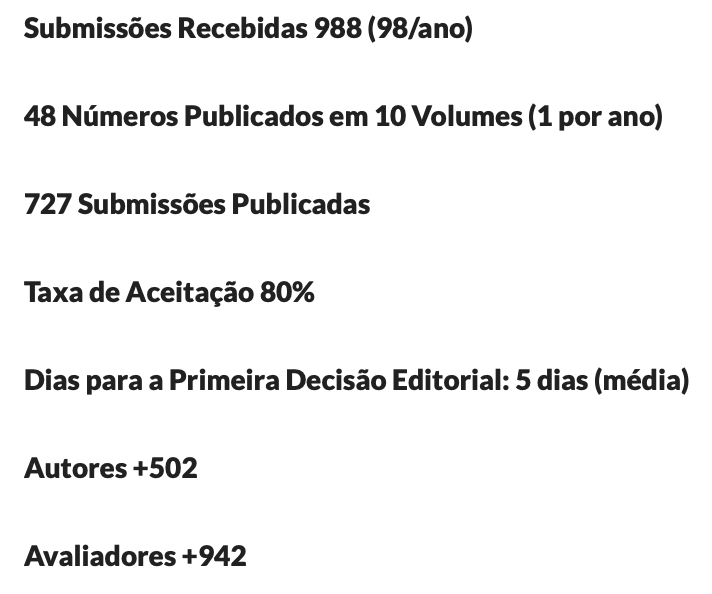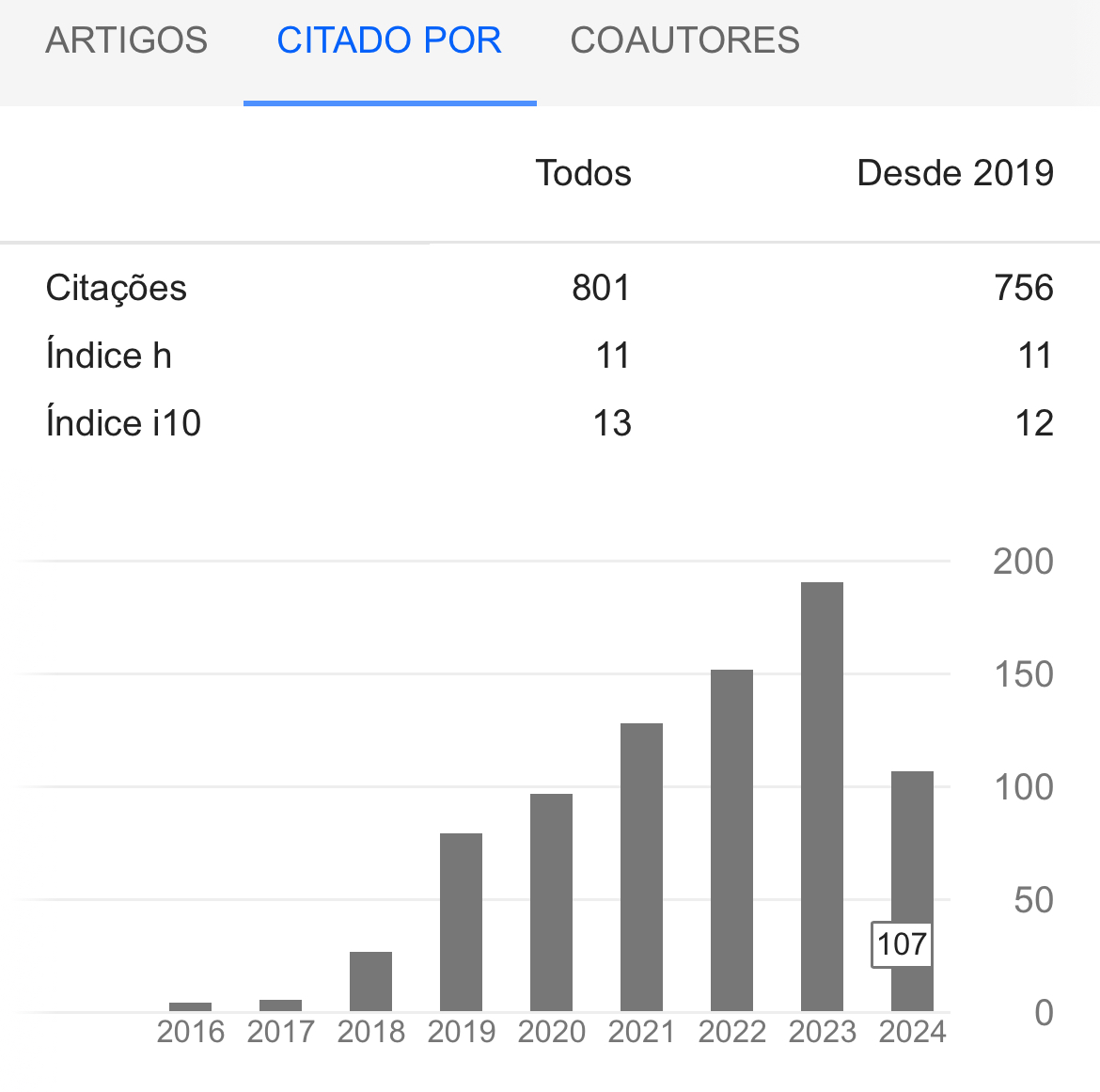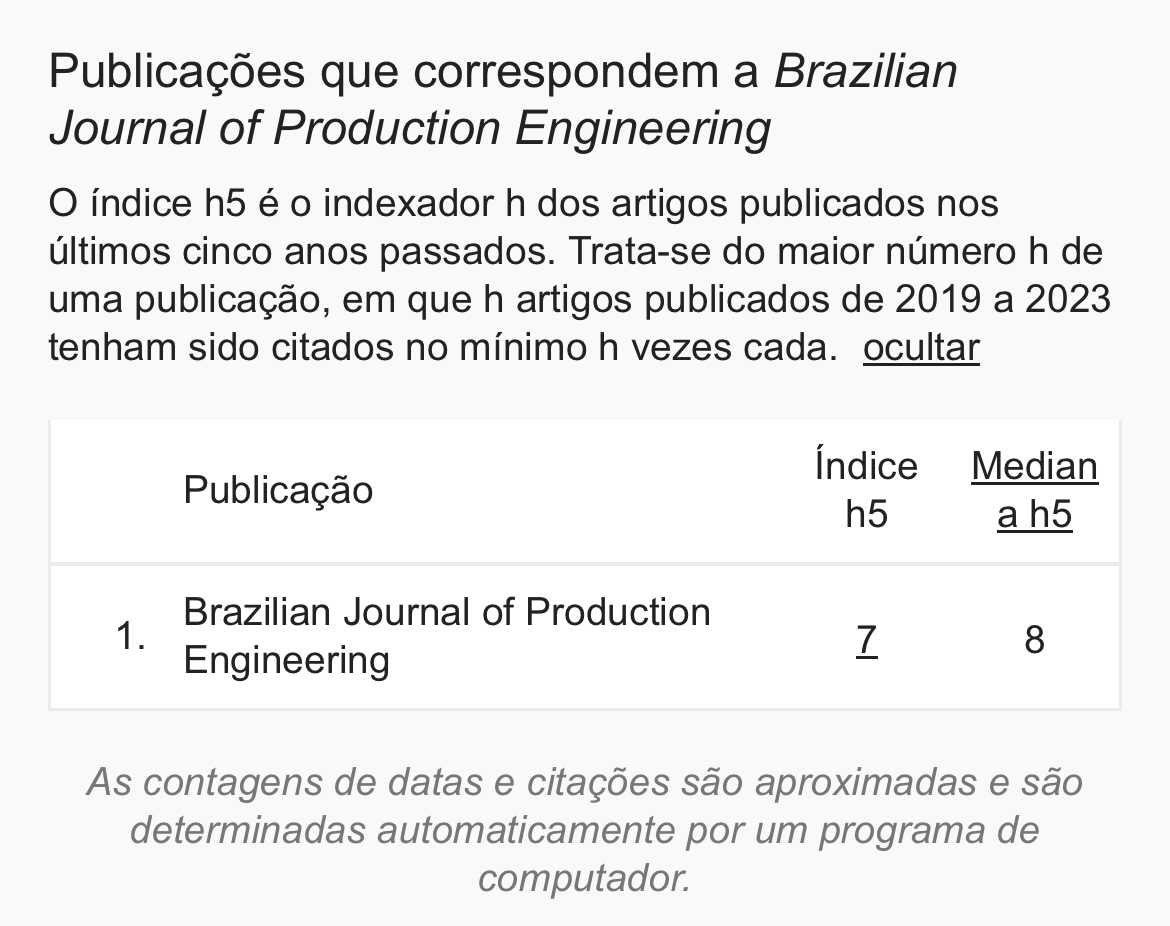The use of industry 4.0 tools in the implementation of skills management: a bibliometric analysis on the impacts in the process
DOI:
https://doi.org/10.47456/bjpe.v8i3.37971Keywords:
Management by Competencies, Industry 4.0, people management, managerial modelAbstract
Recently, the fourth industrial revolution has introduced new innovative technologies that enable higher quality and cost reduction, but it has generated an intensification of market demands, increasing business complexity and reinforcing the need to develop new skills and competences. Therefore, the present study aims to understand the main difficulties encountered by companies in the process of implementing Management by Competencies, and which Industry 4.0 tools are being studied and applied in the HR sector, so that it is possible to identify the solutions with the greatest potential. to simplify and operationalize this model of strategic people management. For this, the 1st phase of the research applies the method of bibliometric analysis seeking articles related to the implementation of Management by Competencies; and in the 2nd phase, bibliometric analysis is applied focused on retrieving scientific productions related to people management in I4.0. Finally, this study allowed us to map resources, tools and strategies identified as viable and efficient solutions to mitigate the barriers commonly faced by companies in Competency Management, enabling a form of management that places the human factor at the center of the strategy.
Downloads
References
Al-Raqadi, A. M. S., Abdul Rahim, A., Masrom, M., & Al-Riyami, B. S. N. (2017). Sustainability of knowledge and competencies management on the perceptions of improving ships’ upkeep performance. International Journal of Systems Assurance Engineering and Management, 8(January 2017), 230–246. https://doi.org/10.1007/s13198-015-0382-2
Albini, A., Peres, A. M., & Almeida, M. L., de. (2021). Contributions of the simplified competency management model to a municipal health secretariat. Revista Latino-Americana de Enfermagem, 29. https://doi.org/10.1590/1518-8345.3385.3429
Andrade, F. S., de. (2012). Análise bibliométrica da produção científica de pesquisadores e referências de um periódico da engenharia de produção. 12-75.
Antosz, K. (2018). Maintenance - Identification and analysis of the competency gap. Eksploatacja i Niezawodnosc, 20(3), 484-494. https://doi.org/10.17531/ein.2018.3.19
Araújo, C. A. (2006). Bibliometria: evolução histórica e questões atuais. Em Questão, 12(1), 11–32. Recuperado de https://brapci.inf.br/index.php/res/download/46788
Arboite, M. R. da S. (2007). Gestão por competência: um novo olhar em relação às políticas e práticas de recursos humanos. Revista Gestão e Desenvolvimento, 4, 11-19. https://doi.org/https://doi.org/10.25112/rgd.v4i1.857
Becker, C. (2011). Estudo sobre as competências dos cios: a visão dos gestores no brasil e nos estados unidos [Pontifícia Universidade Católica do Rio Grande do Sul]. Recuperado de http://tede2.pucrs.br/tede2/handle/tede/5623?mode=full
Boff, L. H. & Abel, M. (2005). Autodesenvolvimento e competências: o caso do trabalhador de conhecimento como especialista. In: Ruas, R., Antonello, C. S., Boff, L. H. Aprendizagem Organizacional e Competências. Bookman: Porto Alegre, (cap. 4), 70-86. Recuperado de http://www.inf.ufrgs.br/bdi/wp-content/uploads/TrabalhadorConhecimentoEspecialistaFinal.pdf
Boog, G. G. (1991). O desafio da competência (Best Selle).
Brandão, H. P. & Guimarães, T. de A. (2001). Gestão de competências e gestão de desempenho: tecnologias distintas ou instrumentos de um mesmo construto? Revista de Administração de Empresas, 41(1), 8-15. Recuperado de https://www.scielo.br/j/rae/a/C3ZbzVBfq8LLhpSppQ4BYbH/?lang=pt
Bruno, G. & Antonelli, D. (2018). Dynamic task classification and assignment for the management of human-robot collaborative teams in workcells. International Journal of Advanced Manufacturing Technology, 98(9-12), 2415-2427. https://doi.org/10.1007/s00170-018-2400-4
Carbone, P. P. (2009). A gestão por competências e gestão do conhecimento. In: P. P. Carbone, H. P. Brandão, J. B. D. Leite & R. M. de P. Vilhena (Eds.), Editora FGV (3.ed), 41-77. Editora FGV.
Carmo, L. O., do. (2016). Gestão de pessoas baseada em competências: um modelo avançado de gestão. Revista de Administração Geral, 1(2), 101-117. Recuperado de https://periodicos.unifap.br/index.php/administracao/article/view/2086
Cavalcante, F. V. & Renault, T. B. (2018). Gestão por competências: uma avaliação das práticas de gestão de pessoas em uma instituição pública de ciência e tecnologia em saúde. RAHIS- Revista de Administração Hospitalar e Inovação em Saúde, 15(2), 89-107. https://doi.org/10.21450/rahis.v15i2.4541
CNI, C. N. da I. (2016). Desafios para indústria 4.0 no Brasil. Portal da Indústria, indústria 4.0. Recuperado de https://www.portaldaindustria.com.br/publicacoes/2016/8/desafios-para-industria-40-no-brasil/
Creswell, J. W. (2014). Investigação qualitativa e projeto de pesquisa: escolhendo entre cinco abordagens. In: Investigação Qualitativa e Projeto de Pesquisa (3 ed.). Penso.
Lima, R. A., de, Velho, L. M. L. S., & Faria, L. I. L., de. (2012). Bibliometria e “avaliação” da atividade científica: Um estudo sobre o índice h. Perspectivas Em Ciencia da Informacao, 17(3), 3-17. https://doi.org/10.1590/s1413-99362012000300002
Decius, J. & Schaper, N. (2021). An instrument for strategic competence development in small and medium-sized industrial enterprises: the Competency Management Tool (CMT). Gruppe. Interaktion. Organisation. Zeitschrift Fur Angewandte Organisationspsychologie, 52(2), 261-277. https://doi.org/10.1007/s11612-021-00566-w
Dutra, J. (2002). Gestão de Recursos Humanos: Modelo, processos, tendências e perspectivas. Atlas.
Fantini, P., Pinzone, M., & Taisch, M. (2020). Placing the operator at the centre of Industry 4.0 design: Modelling and assessing human activities within cyber-physical systems. Computers and Industrial Engineering, 139. https://doi.org/10.1016/j.cie.2018.01.025
Fareri, S., Fantoni, G., Chiarello, F., Coli, E., & Binda, A. (2020). Estimating Industry 4.0 impact on job profiles and skills using text mining. Computers in Industry, 118, 103222. https://doi.org/10.1016/j.compind.2020.103222
Ferrán, J. E. M. (2010). Noção de competência: revisitando a produção científica e a perspectiva de consultores. LUME - Repositório Digital UFRGS, 148. Recuperado de http://www.lume.ufrgs.br/handle/10183/25584
Fleury, M. T. L. & Fleury, A. (2006). Estratégias empresariais e formação de competências: um quebra-cabeça caleidoscópico da indústria brasileira. Atlas.
Gorecky, D., Khamis, M., & Mura, K. (2015). Introduction and establishment of virtual training in the factory of the future. International Journal of Computer Integrated Manufacturing, 30(1), 182–190. https://doi.org/10.1080/0951192X.2015.1067918
Hannola, L., Richter, A., Richter, S., & Stocker, A. (2018). Empowering production workers with digitally facilitated knowledge processes–a conceptual framework. International Journal of Production Research, 56(14), 4729-4743. https://doi.org/10.1080/00207543.2018.1445877
Heradio, R., De La Torre, L., Galan, D., Cabrerizo, F. J., Herrera-Viedma, E., & Dormido, S. (2016). Virtual and remote labs in education: A bibliometric analysis. Computers and Education, 98, 14-38. https://doi.org/10.1016/j.compedu.2016.03.010
Jerman, A., Bach, M. P., & Bertoncelj, A. (2018). A bibliometric and topic analysis on future competences at smart factories. Machines, 6(3), 1-13. https://doi.org/10.3390/MACHINES6030041
Kaasinen, E., Schmalfuß, F., Özturk, C., Aromaa, S., Boubekeur, M., Heilala, J., Heikkilä, P., Kuula, T., Liinasuo, M., Mach, S., Mehta, R., Petäjä, E., & Walter, T. (2020). Empowering and engaging industrial workers with Operator 4.0 solutions. Computers and Industrial Engineering, 139. https://doi.org/10.1016/j.cie.2019.01.052
Kagermann, H., Wahlster, W., & Helbig, J. (2013). Recommendations for implementing the strategic initiative Industrie 4.0. In: A. Hellinger & V. Stumpf (Eds.), Industrie 4.0 Platform (Issue April). Acatech. Recuperado de https://www.din.de/blob/76902/e8cac883f42bf28536e7e8165993f1fd/recommendations-for-implementing-industry-4-0-data.pdf
Kauffeld, S. & Paulsen, H. (2018). Kompetenzmanagement in unternehmen. kompetenzen beschreiben, messen, entwickeln und nutzen. Kohlhammer.
Kazancoglu, Y. & Ozkan-Ozen, Y. D. (2018). Analyzing workforce 4.0 in the fourth industrial revolution and proposing a road map from operations management perspective with fuzzy DEMATEL. Journal of Enterprise Information Management, 31(6), 891-907. https://doi.org/10.1108/JEIM-01-2017-0015
Kipper, L. M., Furstenau, L. B., Hoppe, D., Frozza, R., & Iepsen, S. (2019). Scopus scientific mapping production in industry 4.0 (2011–2018): a bibliometric analysis. International Journal of Production Research, 58(6), 1605-1627. https://doi.org/10.1080/00207543.2019.1671625
Kipper, L. M., Iepsen, S., Dal Forno, A. J., Frozza, R., Furstenau, L., Agnes, J., & Cossul, D. (2021). Scientific mapping to identify competencies required by industry 4.0. Technology in Society, 64(October 2020). https://doi.org/10.1016/j.techsoc.2020.101454
Kochaski, J. (1997). Competency-based management, training & development. Academy Research Library.
Lacerda, R. T. de O., Ensslin, L., & Ensslin, S. R. (2012). Uma análise bibliométrica da literatura sobre estratégia e avaliação de desempenho. Gestão & Produção, 19(1), 59-78. https://doi.org/10.1590/s0104-530x2012000100005
Longo, F., Nicoletti, L., & Padovano, A. (2019a). Emergency preparedness in industrial plants: A forward-looking solution based on industry 4.0 enabling technologies. Computers in Industry, 105, 99-122. https://doi.org/10.1016/j.compind.2018.12.003
Longo, F., Nicoletti, L., & Padovano, A. (2019b). Modeling workers’ behavior: A human factors taxonomy and a fuzzy analysis in the case of industrial accidents. International Journal of Industrial Ergonomics, 69(October 2018), 29-47. https://doi.org/10.1016/j.ergon.2018.09.002
Machado, R. das N. (2007). Análise cientométrica dos estudos bibliométricos publicados em periódicos da área de biblioteconomia e ciência da informação (1990 - 2005). Perspectivas em Ciência da Informação, 12(3), 2-20. Recuperado de https://www.scielo.br/j/pci/a/q57h55TvtPMR7HrGJvBvbdh/?format=pdf&lang=pt
Makarius, E. E., & Srinivasan, M. (2017). Addressing skills mismatch: utilizing talent supply chain management to enhance collaboration between companies and talent suppliers. Business Horizons, 60(4), 495-505. https://doi.org/10.1016/j.bushor.2017.03.007
Malhotra, N. (2006). Pesquisa de marketing: uma orientação aplicada. Bookman.
Martinez-Silveira, M. S., Silva, C. H., da, & Laguardia, J. (2014). A revisão sistemática como método em estudo bibliométrico. Anais do Encontro Nacional de Pesquisa em Ciência da Informação (ENANCIB). Recuperado de https://www.arca.fiocruz.br/handle/icict/29527
Melo, M. C. O. L. (2003). A gerência feminina em setores industrial e bancário: o conservadorismo internalizado versus o moderno em construção. Proceedings of the International Conference of the Iberoamerican Academy of Management.
Munck, L., Munck, M. G. M., & Souza, R. B., de. (2011). Gestão de pessoas por competências: análise de repercussões dez anos pós-implantação. Revista de Administracao Mackenzie, 12(1), 4-52. https://doi.org/10.1590/S1678-69712011000100002
Oliveira, D. A., Gonçalves, R. da S., & Barbosa, A. C. Q. (2014). Percepção dos gestores de recursos humanos em relação so modelo de gestão por competências. Revista FSA, 11(2), 01-26. https://doi.org/10.12819/2014.11.2.1
Podmetina, D., Soderquist, K. E., Petraite, M., & Teplov, R. (2018). Developing a competency model for open innovation: From the individual to the organisational level. Management Decision, 56(6), 1306-1335. https://doi.org/10.1108/MD-04-2017-0445
Prahalad, C. K. & Hamel, G. (2005). Competindo pelo futuro (19th ed.). Campus.
Resende, E. (2000). O livro das competências. Qualitymark.
Rodrigues, F. da C., Júnior, C. V. N. de S., & Almeida, A. N. (2022). Gestão por competências: mapeamento e avaliação na área de segurança universitária. RGO - Revista Gestão Organizacional, 15(1), 187-204. https://doi.org/http://dx.doi.org/10.22277/rgo.v15i1
Romel, F., Tavares, M., Bruno, F., & Da, J. (2021). Análise bibliométrica da produção científica da indústria 4 . 0 e sua relação com a indústria calçadista. Research, Society and Development, 10(6), e52710613863. http://dx.doi.org/10.33448/rsd-v10i6.13863
Ruas, R. (2003). Gestão por competências: uma contribuição à estratégia das organizações. EnANPAD. Recuperado de http://www.anpad.org.br/admin/pdf/enanpad2003-grt-2292.pdf
Schwab, K. (2016). A quarta Revolucao Industrial. In J. L. Vieira & M. L. V. Micales (Eds.), World Economic Forum (1.ed.). Edipro. Recuperado de https://asdfiles.com/26qf7~s
Silva, P. A., Cavalcante, S. M. de A., Silva, P. A., & Silva, M. R. R. (2021). Implantação da gestão por competência em uma instituição de ensino superior pública: desafios e perspectivas. Revista de Gestão e Secretariado, 12(2), 173-202. https://doi.org/10.7769/gesec.v12i2.1188
Souza, C. D., de. (2013). A organização do conhecimento: Estudo bibliométrico na base de dados ISI Web of Knowledge. Biblios: Journal of Librarianship and Information Science, 51(51), 20-32. https://doi.org/10.5195/biblios.2013.108
Sparrow, P. R. & Bognanno, M. (1993). Competency Requirement Forecasting: Issues for International Selection and Assessment. International Journal of Selection and Assessment, 1(1), 50-58. https://doi.org/10.1111/j.1468-2389.1993.tb00083.x
Stocker, A., Brandl, P., Michalczuk, R., & Rosenberger, M. (2014). Mensch-zentrierte IKT-Lösungen in einer Smart Factory. E & i Elektrotechnik Und Informationstechnik, 131(7), 207-211. https://doi.org/10.1007/s00502-014-0215-z
Tessarini, G. J., & Saltorato, P. (2018). Impactos da indústria 4.0: Uma revisão sistemática da literatura. Revista Produção Online, 18(2), 743-769. Recuperado de https://producaoonline.org.br/rpo/article/download/2967/1678%0A
Virgillito, A. (2018). Einführung eines strategischen Kompetenzmanagements in nicht-forschungsintensiven KMU. In Fraunhofer IRB, 11(1).
Whysall, Z., Owtram, M., & Brittain, S. (2019). The new talent management challenges of Industry 4.0. Journal of Management Development, 38(2), 118–129. https://doi.org/10.1108/JMD-06-2018-0181
Woszezenki, C. R. & Gonçalves, A. L. (2013). Mineração de textos biomédicos: Uma revisão bibliométrica. Perspectivas em Ciencia da Informacao, 18(3), 24-44. https://doi.org/10.1590/S1413-99362013000300003

Published
How to Cite
Issue
Section
License
Copyright (c) 2022 Brazilian Journal of Production Engineering - BJPE

This work is licensed under a Creative Commons Attribution-NonCommercial-ShareAlike 4.0 International License.











































































